If you have never been on safari before, packing can be quite daunting. Are you taking too much, too little, what will the weather be like, are there laundry services, how smart do you have to dress in the evenings? We have all been through this and we have all asked these questions.
Whether you’re a seasoned traveler or on your first safari, preparing the right Tanzania Safari Packing List is key to a smooth adventure. With the essentials on hand, you’ll be set for a comfortable, unforgettable journey into Tanzania’s wild landscapes.
Visualize this: a sturdy hat shielding you from the sun, a good camera and binoculars ready to capture every incredible moment. But keep in mind, a safari requires thoughtful packing beyond just the basics. Since you’ll be exploring the African wilderness, planning your bag carefully is essential. While not every item may be provided in your Tanzania Safari Package, you may be able to rent any additional gear you need.
Tanzania’s climate is typically warm and dry, though temperatures vary with location and season. Packing for a Tanzania Safari should account for these weather changes, with practical, versatile clothing and gear suited to both warm days and cooler evenings.
Another consideration is airline baggage restrictions. Many flights to Tanzania limit luggage to around 15 kilograms (33 lbs) per person, including cameras and carry-ons, so pack mindfully to stay within the weight limit.
TOURS & SAFARIS :
Tanzania Safari Packages, Tanzania Family Safari, Budget Camping Safaris, Fly in Tanzania Safaris, Tanzania Honeymoon Safari, Serengeti Wildebeest Migration, Luxury Safaris in Northern Tanzania, Midrange Safaris in Tanzania, Photographic Safari, Anniversary Adventure, Beach Holiday, Birthday Experience.
IMPORTANT :
MORE USEFUL TRAVEL TIPS :
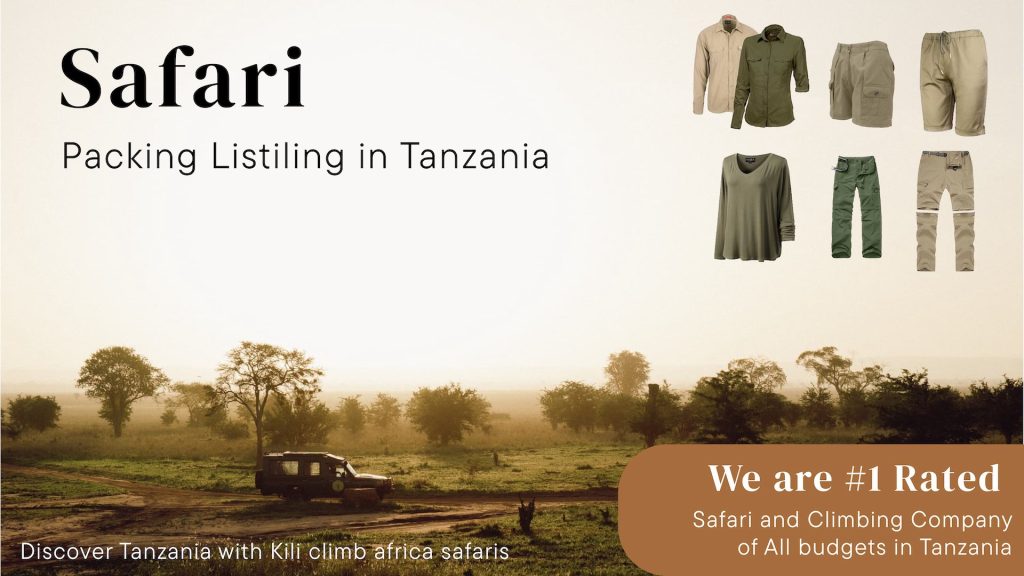
Experience the thrill of wildlife in action with the top safari operator in Tanzania. Request a quote from our trusted local tour provider.
First and foremost, remember that most charter flights in Africa have strict luggage requirements and you most likely will not be able to bring a bag that exceeds 15 kg (33 lbs). Keep this in mind while packing for your next safari!
International Certificate of Vaccination (for yellow fever inoculation)
Relevant visas
Valid passport
Cash in USD PASSPORT

Hard shell luggage is not permitted on light aircraft. It’s best to pack your items in a duffel bag or backpack, which will also help minimize weight. Choose waterproof and dust-proof materials for added protection.
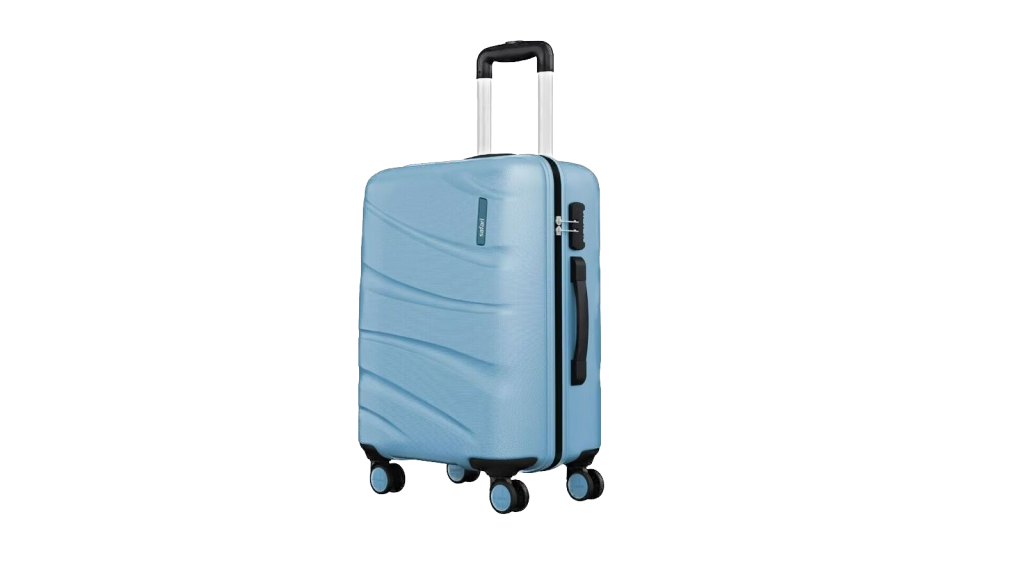
Temperatures can fluctuate greatly during a typical safari, so be sure to pack both short and long-sleeve shirts, along with a fleece jacket for layering. Avoid overpacking, as most camps offer laundry services.
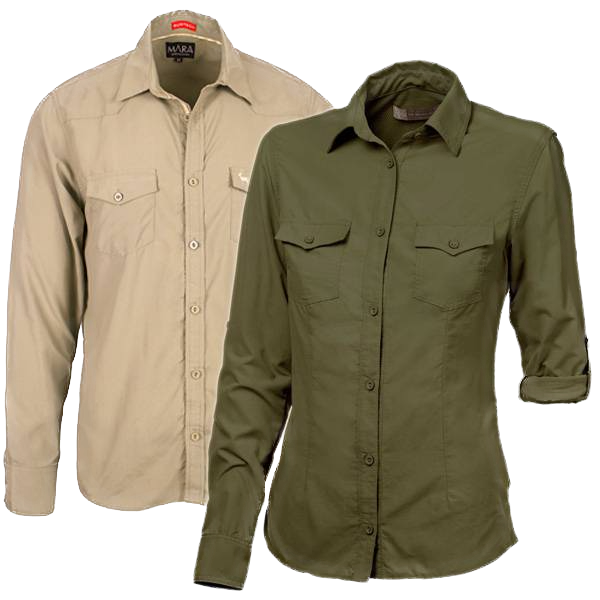
Proper footwear is crucial for your safari, so be sure to pack closed-toe shoes. Break them in before your trip to prevent blisters and discomfort. These shoes will also provide protection against dangerous creatures like scorpions. Additionally, pack a pair of sandals for relaxing around camp.
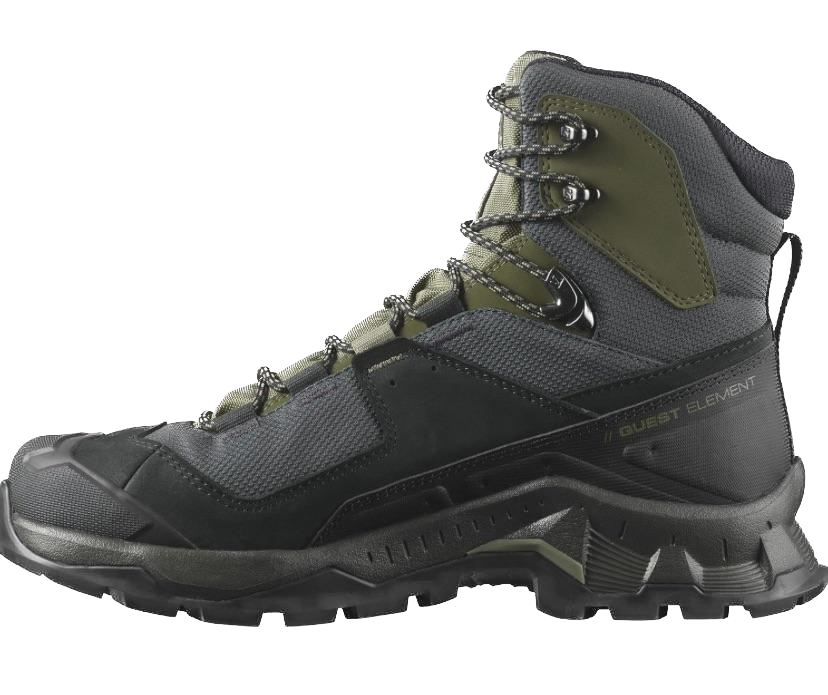
If your safari destination is in a malaria-prone area, make sure to pack anti-malaria tablets, along with anti-nausea medication, painkillers, and any prescription medications recommended by your doctor.

If you’re bringing a camera, be sure to pack extra memory cards and batteries. Additionally, consider bringing an adapter, binoculars, and a headlamp or flashlight with spare batteries.

Do not pack black, blue, or bright colors for your clothing and shoes. Instead, choose neutral tones like khaki, tan, or brown. Additionally, steer clear of clothing with camouflage patterns, as they are not well-received by local communities.

PRO TIPS
BRING PAIR OF GLASSES
and opt to leave your contact lenses at home as dust can cause difficulty seeing
AVOID JEANS AND FLANNEL,
takes forever to dry safaris
We highly recommend following the Essential Tanzania Safari Packing List for all your safari tours. This guide offers a clear picture of the necessities for a successful safari in Tanzania. Though packing for Tanzania might seem overwhelming, this list of must-have items will simplify your preparation, ensuring you’re fully equipped for your adventure.
Clothes to pack
The clothing you pack will depend on the season and your travel plans. Tanzania experiences varied weather conditions, so it’s essential to pack accordingly. During the day, expect warm to hot and dry conditions, while mornings and evenings can be quite cool. Pack versatile clothing to stay comfortable in all situations.
What to Wear on a Tanzania Safari
The clothing you pack will depend on the season and your travel plans. Tanzania experiences varied weather conditions, so it’s essential to pack accordingly. During the day, expect warm to hot and dry conditions, while mornings and evenings can be quite cool. Pack versatile clothing to stay comfortable in all situations.
TOP
WOMEN
Safari shirt
Hooded safari jacket
3 short sleeve shirts
3 cotton t-shirts
Fleece zip-up jacket
2 long-sleeve shirts (styles with tabbed, rollable sleeves are most versatile)
MEN
Fleece pullover
Lightweight jacket
Breathable short sleeve shirt
Moisture-wicking tank top
Safari shirt
Soft-shell water-resistant jacket
KIDS
Two short-sleeve shirts
Anti-insect safari shirt
Knitted cotton polo shirts
Two long-sleeve shirts
Fleece jacket
High-neck/turtleneck shirt
Bottoms
WOMEN
Linen drawstring pants
High-rise moisture-wicking leggings
Lightweight, water-resistant safari pants
High-rise athletic leggings
MEN
Zip-off safari pants
Water-resistant hiking pants
KIDS
Jeans (optional, for colder nights)
Two pairs of zip-off safari pants
One pair shorts
Undergarments
WOMEN
Breathable, moisture-wicking bra
Moisture-wicking briefs
Moisture-wicking thongs
MEN
Moisture-wicking boxers
KIDS
Five pairs underwear
Accessories
WOMEN
Buff wrap to protect your face from dirt or to keep your hair out of your face
Scarf to wrap yourself on cold morning and evening game drives.
Sunglasses with polarized lenses
MEN
Buff wrap to protect your face from dirt or to keep your hair out of your face
Sunglasses with polarized lenses
KIDS
Sun hat
Swimsuit and goggles
Clothing Tips for a Safari in Tanzania
When planning what to wear on a Tanzania safari, keep these tips in mind:
Are Colors Important?
When you picture the classic safari outfit, you might imagine beige zip-off pants, a khaki shirt, a safari hat, and a pair of binoculars—all the essentials for your dream Tanzania safari adventure. But why stick to neutral shades like beige and khaki instead of bolder colors like red?
Safari Footwear
As you prepare your safari packing list, don’t overlook the importance of selecting the right footwear—it’s just as essential as choosing appropriate clothing. We recommend purchasing your safari boots at home, as the cost of boots in Tanzania is often higher.
If you’re planning to climb Mount Kilimanjaro, be sure to bring sturdy hiking boots with solid ankle support. For a safari focused on game drives, casual shoes, flip-flops, and sandals will suffice. Here’s a quick checklist:
Important/ Essential Documents
Traveling to Tanzania should be an unforgettable experience, so it’s crucial to pack all necessary travel documents. Missing any of these can derail your entire safari adventure. To help you prepare, here’s a comprehensive list of the essential documents for your Tanzania safari:
Passport: Ensure your passport is valid for at least six months beyond your arrival date in Tanzania.
Yellow Fever Certificate: Since there is a risk of Yellow Fever in Tanzania, a vaccination certificate is required. Check the National Travel Health Network and Centre’s Travel Health Pro website for more details.
Tanzania Visa: Tanzania offers an e-visa option that can be applied for online. British passport holders will need a tourist or business visa to enter the country. For further information, visit the Tanzania Immigration website.
Medical Insurance: Obtain valid travel insurance that covers medical emergencies, including medical evacuation and associated costs.
Vaccination Records: A valid COVID-19 vaccination certificate is required for entry into Tanzania. Ensure you’re fully vaccinated and carry your certificate with a QR code to present upon arrival. For updates, refer to the Ministry of Health of Tanzania and the WHO.
Airline Tickets: Keep your airline tickets in a secure pocket of your luggage, as you will need them to begin your safari.
Credit Cards and ATMs: Instead of carrying large amounts of cash, bring credit or debit cards for transactions in Tanzania. An ATM card is also advisable for safe access to cash.
Document Copies: Make copies of your passport, Tanzanian e-visa, airline tickets/schedule, and itinerary. Leave one copy with someone at home and keep another in your luggage for safekeeping.
Medications
If you happen to catch a bug, having cold medicine such as aspirin may be necessary.
Keep an antihistamine such as Benadryl handy to protect yourself from insect bites.
It's advisable to include painkillers in your First Aid kit, as they may come in handy.
When traveling to Tanzania, be sure to pack malaria medication to minimize your risk of contracting the disease.
Make sure to include some antidiarrheal medication in your packing list for your safari in Tanzania.
While exploring the Tanzanian bush, it’s important to apply insect repellent during your safari.
Pro Tips: In your medical kit, keep medications that have been personally recommended by your doctor.
Electronics And Gadgets
It’s essential to bring your electronic devices when traveling to various destinations, as they allow you to stay in touch with family and friends. Typically, safari vehicles, lodges, and camps come equipped with power outlets; however, it’s wise to also include a power bank along with your charger. Additionally, there are other items you should consider for your Tanzania Safari Packing List:
Adapters and Chargers: Many travelers wonder, “What type of adapter do I need for Tanzania?” To avoid any issues, bring a universal travel adapter.
A Quality Camera: Experiencing wildlife is thrilling, and you’ll want to capture those unforgettable moments. While smartphones are popular for photography, a high-quality camera will provide superior images.
Binoculars: Bringing a good pair of binoculars can enhance your safari experience, allowing you to see smaller animals more clearly.
Power Bank: When preparing your safari gear, include a heavy-duty power bank. This is particularly important if you plan to use your phone for taking photos and videos during your game drives.
Toiletries & Personal Hygiene
An essential component of your packing list for Safaris in Tanzania is your personal toiletries. No African Safari Packing List is truly complete until you’ve included your favorite hygiene items. Although most safari lodges and camps will provide basic toiletries, having your go-to products can make all the difference in your comfort. So, as you prepare for your Tanzania Safari, be sure to set aside those essential toiletries that you can’t do without.
Some Essential Toiletries
Soap
Shampoo, conditioner, hair gel
Hairbrush, comb, mirror, hair ties
Toothbrush and toothpaste
Deodorant
Sunscreen
Facial tissue
Handy wipes
Hand sanitizer
Lip balm with sunscreen
Small towel and washcloth
Toilet paper
Shaving supplies
Nail clippers and nail brush
Insect repellent
Sewing kit
Feminine products
Cosmetics
Gifts for Guide and Locals
Sharing gifts with your guides and the local communities in Tanzania can create an uplifting atmosphere filled with positive energy. A thoughtful gift can brighten their day and bring smiles to their faces, making your experience on your Safaris to Tanzania even more meaningful.
Packing For Your Flight To Tanzania
When packing for your Tanzania Safari, don’t forget the essentials you’ll need during your flight. It’s easy to overlook these items, so we’re here to help you prepare effectively. Be sure to include the following essentials in your carry-on:
Camping Gears For Tanzania Safari
A safari in Tanzania is incomplete without experiencing a camping adventure in the heart of the African bush. When planning your Safari Packing List for Tanzania, it’s essential to include items suited for a camping trek.
For a camping safari in Tanzania’s National Parks, you’ll need the right gear:
Note: You can also rent a sleeping bag while you will trek to Mount Kilimanjaro and other safari gear in Tanzania.
TANZANIA SAFARI CHECKLIST
Safari clothing
Electronics/other
Travel Documents
First aid/toiletries
Selecting the right bag for an African safari is a crucial decision. Packing your belongings in the appropriate luggage can make a significant difference. For your Safari in Tanzania, you will need two essential types of bags:
When preparing for a safari in Tanzania, opting for soft luggage is highly recommended. A soft duffel bag is more practical than a rigid suitcase for travel. Ideally, select a duffel bag with a capacity of 80 liters or more to accommodate your gear. Ensure it features a robust zipper system, and consider locking it for added security to keep your belongings safe during your adventure.
In addition to your duffel bag, it's essential to bring a daypack for your Safari to Tanzania. This smaller bag is perfect for carrying your daily necessities, such as sunscreen, sunglasses, snacks, water, your passport, and other essentials. A daypack ensures you have everything you need easily accessible while you explore the beautiful landscapes and wildlife.
Pro Tips: Invest in some packing cubes, it’s an awesome space-saving hack.
Your Tanzania Safari Packing List should be influenced by the weather conditions and the time of year you choose to visit. Here’s what to consider:
For up-to-date weather information, download the Weather+ app, which provides a reliable 6-day forecast for both daytime and nighttime conditions. This can be extremely useful as you plan your safari.
It’s well-known that weather conditions can vary significantly across Tanzania. The climate is typically categorized into two dry seasons and two wet seasons. Therefore, it’s important to pack your bag according to the season you’ll be visiting. Here’s how to do it:
Season
Spring (Long rainy season)
Summer (Long dry season)
Fall (Short rainy season)
Winter (Short dry season)
Running Months
March, April, and May
June, July, and August
September, October, and November
December, January, and February
Average Temperature
24°C to 29°C (75°F and 85°F)
21°C to 27°C (70°F to 80°F)
27°C to 32°C (80°F and 90°F)
29°C to 35°C (85°F and 95°F)
Packing List
When preparing for a Tanzania safari, selecting the right gear is essential for a comfortable and enjoyable experience. Keep in mind that prices can differ significantly based on brand, quality, and purchasing location. Below is a detailed Tanzania Safari Packing List with estimated prices to assist you in your planning and budgeting.
Items
Lightweight, breathable, long-sleeved shirts
T-shirts
Lightweight, breathable pants (preferably convertible)
Shorts
Hat with a wide brim to protect from the sun
Bandana or scarf for dust protection
Comfortable walking shoes or hiking boots
Sandals or flip-flops for around the campsite
Warm jacket or fleece for early morning and evening game drives
Swimsuit (if your accommodation has a pool)
Binoculars
Camera with extra batteries and memory cards
Lightweight backpack or daypack
Water bottle with a built-in filter or purification tablets
Flashlight or headlamp with extra batteries
Insect repellent with DEET
Sunscreen with a high SPF
Personal toiletries and medication
Small first-aid kit with blister pads and any prescription medication
Multi-purpose tool or knife
Electrical adapter (if necessary)
Portable charger for electronic devices
Books or magazines
Field guides
Travel pillow
Binocular harness or strap
Spare set of prescription glasses or contact lenses
Snacks or energy bars
Portable fan or misting fan
Small, lightweight tripod for photography
Collapsible walking stick
Estimated Price Range (USD)
10 – 30
5 – 10
10 – 30
10 – 20
10 – 20
10 – 20
5 – 10
15 -35
5 – 10
15 – 30
10 – 20
15 – 17
100 – 400
13 – 30
10 – 20
7 – 12
5 – 10
8 – 10
10 – 25
10 – 20
10 – 15
10 – 20
5 – 20
10 – 20
10 – 20
3 – 10
10 – 20
10 – 100
5 – 10
15 – 30
20 – 70
8 – 15
NOTE: The prices listed are estimates and can vary depending on the brand, quality, and where you purchase them.
Opting to rent gear for a Tanzania safari can be both convenient and budget-friendly, particularly if you don’t expect to use the equipment again after your adventure. Rental costs may vary based on quality, brand, and the rental provider’s location. Here’s a detailed Tanzania Safari Packing List with estimated rental prices to help you plan and budget effectively.
Items
Estimated Price Range (USD)
Clothing
3 – 5 per Day
Lightweight, breathable, long-sleeved shirts
3 – 5 per day
T-shirts
2 – 4 per Day
Lightweight, breathable pants (preferably convertible)
4 – 6 per Day
Shorts
3 – 5 per Day
Hat with a wide brim to protect from the sun
Sunglasses
1 – 3 per day
Comfortable walking shoes or hiking boots
7 – 15 per day
Sandals or flip-flops for around the campsite
3 – 5 per day
Accessories and Equipment
Binoculars
10 – 20 per day
Camera with extra batteries and memory cards
15 – 25 per day
Lightweight backpack or daypack
5 – 10 per day
Water bottle with a built-in filter or purification tablets
2 – 4 per day
Flashlight or headlamp with extra batteries
2 – 4 per day
Insect repellent with DEET
2 – 4 per day
Sunscreen with a high SPF
2 – 4 per day
Personal toiletries and medication
5 – 10 per day
Small first-aid kit with blister pads and any prescription medication
5 – 10 per day
Multi-purpose tool or knife
3 – 5 per day
Electrical adapter (if necessary)
2 – 4 per day
Portable charger for electronic devices
5 – 10 per day
Books or magazines
2 – 4 per day
Field guides
2 – 4 per day
Travel pillow
3 – 5 per day
Binocular harness or strap
1 – 3 per day
Portable fan or misting fan
5 – 10 per day
Small, lightweight tripod for photography
5 – 10 per day
Collapsible walking stick
3 – 5 per day
Please note that the prices provided are approximate and may differ based on the rental company and location. It's advisable to confirm with your tour operator or travel agent for specific suggestions or requirements. Remember to reach out to them for tailored advice.
You’ve already reviewed the essential packing list for your Tanzanian safari. Now, let’s focus on what not to bring. Traveling light has been a priority from the beginning, so here are a few items to leave out of your luggage.
Don’t pack lots of cloths
A key aspect of your Africa safari packing list is to keep it light and limit the amount of clothing you bring. Pack a few lightweight items, as most of your time will be spent in national parks enjoying safari activities.
Don’t take excessive electronics
It’s best to avoid bringing excessive electronics on your safari to Tanzania. Although Tanzania is generally safe, petty theft can occur in some areas. To minimize risk, leave unnecessary electronics at home.
Don’t carry lots of cash
When visiting Tanzania, it’s best to avoid carrying large amounts of cash, as it can be a hassle and a potential risk. ATMs are widely available across the country, except in some rural areas, so accessing cash won’t be an issue. Instead, bring along your ATM or debit card for easy withdrawals when needed, though you won’t get dollars, but rather Tanzania local Currency (Shillings).
Don’t bring expensive jewelry
Remember, while on vacation in Tanzania, it’s best to leave valuable jewelry at home. Expensive items can attract unwanted attention or may get lost during travel. To avoid these risks, we recommend not bringing any precious ornaments with you.
Reaching your dream safari destination usually requires long flights, and it’s important to be aware of the strict weight limits and maximum dimensions for luggage. Generally, the allowance is 15 kg (33 lbs) per person.
Air Lines
Weight Allowance(per person)
Weight Includes
Maximum Dimensions
Excess Baggage Cost
As Salaam Air
20 kg / 44Ibs
Handbag and must be in soft duffel bags
60cm x 30cm x 25cm (24” x 12” x 10”)
$ 03 per additional kilogram
Flightlink Airline
20 kg / 44Ibs
Handbag and must be in soft duffel bags
60cm x 30cm x 25cm (24” x 12” x 10”)
$ 03 per additional kilogram
Air Excel
20 kg / 44Ibs
Handbag and must be in soft duffel bags
60cm x 30cm x 25cm (24” x 12” x 10”)
$ 03 per additional kilogram
Safari Air Link
15kg / 33lbs
Handbag and must be in soft duffel bags
90cm x 65cm x 35cm (35” x 25” x 13”)
$50 for 0-10 kgs, $80 for 11-20 kgs, $145 for 21-30 kgs.
Auric Air
20kg / 44lbs
Handbag and must be in soft duffel bags & camera
60cm x inches 45cm x inches 33cm (24” x 18” x 13”)
$60.00 & $30.00 per slab
Coastal Aviation
15kg / 33lbs
Handbag and must be in soft duffel bags
76cm x 48cm x 29cm (30” x 19” x 11”)
$85-$95 per bag
Pro Tips: Soft bags, such as duffel bags, are highly recommended. Excess baggage may be transported only if the aircraft's weight capacity and space allow, and additional charges will apply at the current freight rates.
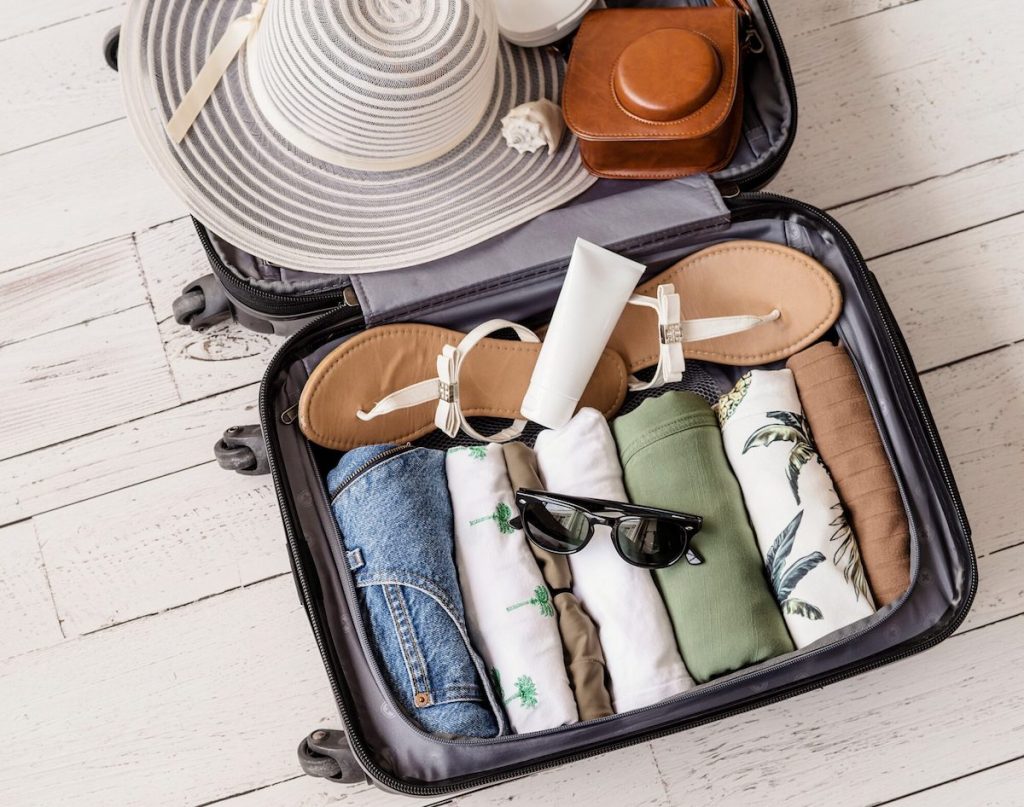
What to Pack for Your Safari in Tanzania? In addition to the guidelines already mentioned, consider these general recommendations for your packing list for a Tanzania safari:
Travel Light and Get Ready for an Unforgettable Safari in Tanzania!
We hope our Tanzania Safari Packing List assists you in preparing for an incredible adventure. Now, take a moment to double-check that you have all the items outlined in this guide, and get ready to explore the stunning landscapes of Tanzania on your own. Share your desired Tanzania Safari Packages with us, and we’ll make sure you have the safari of a lifetime!
Prepared for an Unforgettable Adventure with This Tanzania Safari Packing List!
Reaching your dream safari destination usually requires long flights, and it’s important to be aware of the strict weight limits and maximum dimensions for luggage. Generally, the allowance is 15 kg (33 lbs) per person.
Opt for comfortable, lightweight clothing appropriate for safari vehicles and game-viewing activities.
Since Tanzania is a malaria-risk country, it’s essential to bring a mosquito net and repellent with you. While all lodges and camps, whether luxury or tented, typically provide mosquito nets, it’s still wise to carry your own mosquito repellent during your safari in Tanzania. This will help protect you from malaria.
Travelers planning to visit Tanzania for a holiday should apply for an ordinary visa, which costs $50 per person. U.S. passport holders traveling to Tanzania for tourism need to obtain multiple entry visas. Those who are not American citizens and wish to apply for multiple visas are strongly encouraged to familiarize themselves with the specific requirements for obtaining them.
Tanzania enjoys a generally pleasant climate throughout the year, although conditions can vary by region. The tropical coast tends to be quite hot and experiences heavy rainfall, while the central plateau is cooler and drier.
Tanzania experiences two rainy seasons: the long rainy season lasts from mid-March to May, while shorter rains occur from November to January. The dry season, characterized by cooler temperatures, runs from May to October.
Daytime temperatures typically range from 70°F to 90°F, dropping to between 50°F and 60°F at night.
Yes, a wide-brimmed hat or cap is essential for shielding your face and neck from the sun.
Bringing a lightweight jacket or fleece is recommended, as temperatures can drop considerably during early morning and evening game drives.
Yes, it’s advisable to bring a high-SPF sunscreen to protect your skin from the strong sun.
Yes, bringing insect repellent is strongly recommended to protect yourself from mosquitoes and other insects.
Yes, bringing a camera is highly recommended to capture Tanzania’s breathtaking wildlife and landscapes.
Yes, bringing binoculars is highly recommended for spotting wildlife from afar.
Yes, it is strongly recommended to bring a reusable water bottle to minimize plastic waste.
Yes, it’s advisable to bring snacks like energy bars or nuts to keep you energized during the game drives.
Wearing shorts on a Tanzania safari is not recommended, as they provide limited protection from the sun, insects, and thorny bushes.
We hope our Safari Packing List for Tanzania assists you in getting ready and ensures you have everything you need for this incredible adventure. Now, take a moment to double-check your list against the items mentioned in this guide as you prepare to explore the beautiful landscapes of Tanzania. Share your itinerary with us, and we’ll make sure you have the safari of a lifetime!
What our Client Say
EXCELLENTVerified The best, most thoughtful and memorable hiking tour I went with my dad on the 8 day Lemosho Route Kilimanjaro climb with Kiliclimb, and Moses and his team put together an absolutely incredible trip! Everything was flawless from start to finish, from the organization and service to the guides, crew, and overall experience.Our guides (Baraka and Godson) were the best and genuinely so kind and caring, checking in constantly and even doing daily wellness checks. They provided daily briefings and always clearly communicated what was ahead. What stood out to me even more was hearing the guides talk about how great Moses is and how much they enjoy working for him. That says a lot about the company and, in my opinion, really matters when choosing an outfitter!The food was spectacular the entire trip and clearly planned with altitude in mind. We had the best soup every day, plus amazing fish, chicken, beef, and yes, even pizza! The whole team was remarkable and so tuned into our needs, including setting up a private bathroom tent, which was a huge comfort.Moses went above and beyond personally as well. Before the trip, he reviewed my gear and flagged that I did not have warm enough layers for summit day, then loaned me a jacket and pants so I was properly prepared. He also arranged transportation to and from the airport, making it truly feel like a full package experience.I could not have asked for a better Kilimanjaro climb, and I highly, highly recommend Kiliclimb to anyone considering the mountain!Posted onVerified Kili, wow I did it. Großartige Tour mit einem tollen Veranstalter. Sehr gute Betreuung von einem perfekt vorbereitetem, zuverlässigen erfahren Team. Kann ich nur empfehlen, war sehr spaßig und voller neuer, schöner Eindrücke trotz Anstrengung, die eine Tour auf einen 5895 Meter hohen Berg, mit sich bringt.Posted onVerified Great communication, reliable service, good value for money and an unforgettable Kilimanjaro tour. Our Kilimanjaro tour was an incredible experience, made truly unforgettable by a mature, highly reliable, trustworthy, friendly, positive, and very experienced team.”Posted onVerified The best Guide for Kilimanjaro and safari in Africa My friend and I did 6 days Kilimanjaro Climb via The Machame Route for 6 days and The whole Team was Super Helpful and Friendly from Answering our queries 24/7 available to Day one to day 6 everything went really Smoothly and professionally!! We got Top notch Service and you could tell that they really care and passionate about their job !! I would highly recommend this company to anyone who wants the best experience in Tanzania and on mountain KilimanjaroPosted onVerified Amazing Local Company A friend and I went on a 4-day private safari through Tarangire, Ngorongoro Crater, and the Serengeti, and it was absolutely incredible. From start to finish, the Kiliclimb staff exceeded our expectations. After completing our Kilimanjaro trek, we were staying at a hotel in Arusha and were greeted by the team and picked up directly from the hotel, which made the transition seamless and stress-free.We were incredibly lucky to have Ombeni as our guide. Thanks to his deep knowledge of the parks and strong relationships with other guides and rangers, we saw every animal we hoped for. He constantly checked in with us, asking for feedback and what we wanted to focus on each day, which made the experience feel truly personalized.Ombeni was funny, kind, and genuinely made the trip unforgettable. And don’t sleep on his photography skills, he’s seriously talented! We couldn’t recommend this local company more. They also gave us t-shirts and safari hats which was a nice touch!Posted onVerified Unforgettable 4-Day Adventure – Onbeni is a Legend! Our 4-day trip through the Serengeti, Ndutu, and Ngorongoro was the highlight of our travels, and that is entirely thanks to our guide, Onbeni.From the start, Onbeni brought a high-energy, positive vibe that made every game drive an adventure. His "superpower" is undoubtedly his eyes—his ability to spot wildlife is incredible. The absolute highlight was when Onbeni was the first to spot a rare leopard, giving us a private viewing before any other vehicles arrived!We also spent an unforgettable time driving alongside the Wildebeest migration, witnessing the magic of the newborn babies in Ndutu. Onbeni’s professionalism and deep knowledge of the land made us feel safe and informed throughout. If you want a guide who is professional, energetic, and has a "sixth sense" for finding animals, ask for Onbeni!Posted onVerified 5/5 stars! 5/5 stars! This Tanzania safari local agency made our trip absolutely unforgettable. Our guide was super knowledgeable about wildlife—we spotted the Big Five smoothly and he shared fascinating facts about animals and local culture. The 4x4 jeep was comfortable, transfers were on time, and the lodges were clean with great food. No hidden fees, flexible schedule, and the team cared about every detail. 100% recommend for an amazing African safari experience!Posted onVerified Great experience! Kiliclimb organized an extremely wonderful safari overall. Our expectations were exceeded by far. From the organization, to the hospitality, to the experiences, accommodations, and personal relationship with our guide Ombeni. Ombeni did an outstanding job. He knew every national park very well and knew exactly where we could observe animals. He was very friendly and always responded to our needs. You couldn't ask for a better guide than Ombeni at your side. Communication with the Kiliclimb management also worked wonderfully. We would recommend a safari with Kiliclimb at any time. Asante sana!Posted onVerified Once-in-a-lifetime experience Our safari tour was a unique experience! We didn't expect to see so much! We saw the Big Five, we saw a wildebeest migration, we saw the birth of a wildebeest calf and much more. Our guide, Ombeni, accompanied us for seven days and made so much possible for us. His flexibility, warmth and knowledge were invaluable. We felt very comfortable and highly recommend Kiliclimb! Thank you for everything. Asante sana!Posted onVerified Unforgettable 7-day safari with Kiliclimb Safari – highly recommended! Our 7-day personalized safari with Kiliclimb Safari was simply fantastic and exceeded all our expectations. Thanks to our great guide Ombeni, the best guide you could wish for, we saw and learned an incredible amount. Every day was a new highlight!The tour was superbly organized, everything ran smoothly and professionally. The contact with Janeth via WhatsApp was particularly good. She was always available, extremely helpful, and always responded quickly and friendly. You feel well taken care of from the very beginning.We would book this safari again anytime and can recommend Kiliclimb Safari and Ombeni 100%. A unique experience that we will never forget!












+255 768 735 700 (Managing Director)
+255 764 117 423 (Founder & Expert Guide)
